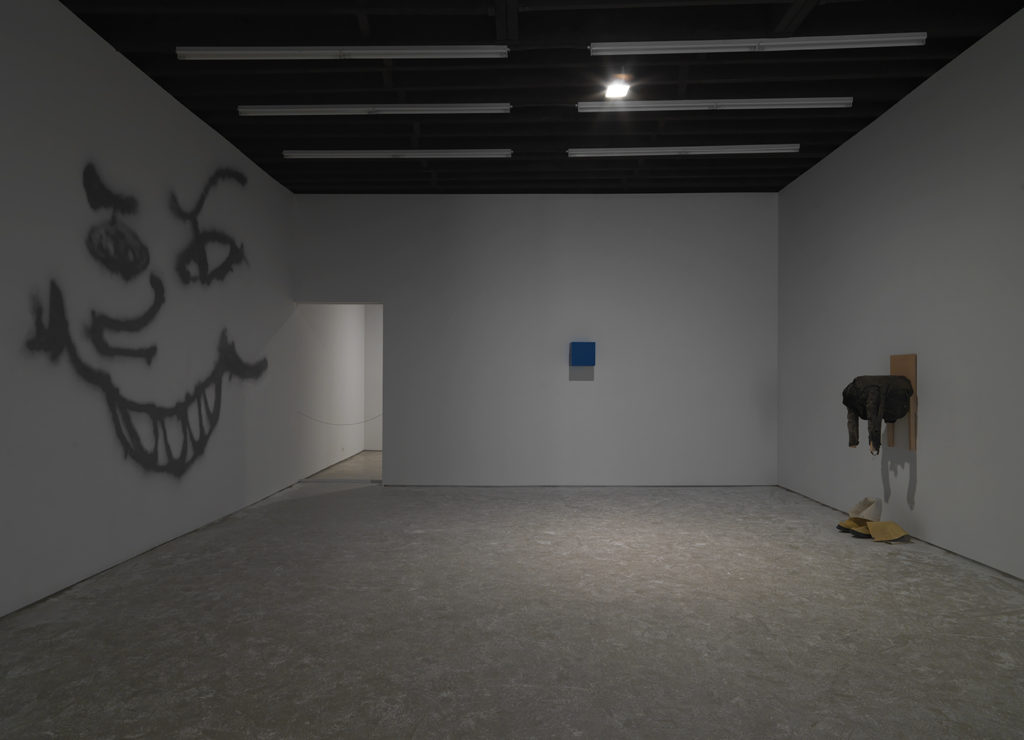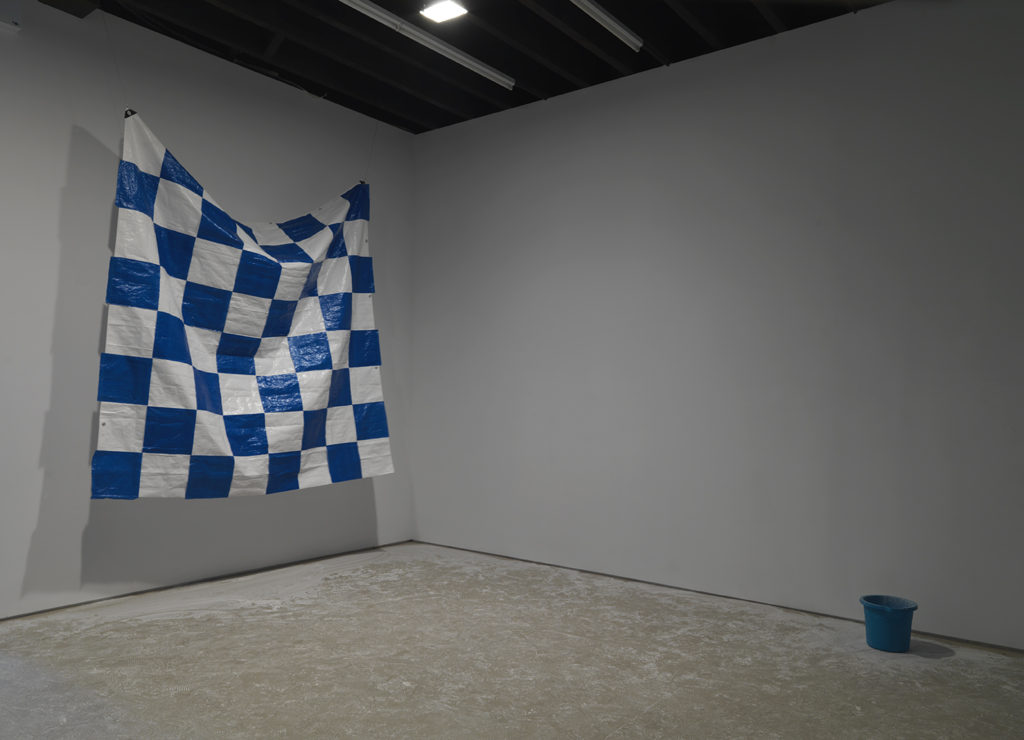Noise/computer musician Jeff Witscher aka Rene Hell and Yale Union curator Mark Lewis’ exhibition at Lisa Cooley ended after a swift ten-day run on Friday, August 26. Two days later, news broke that the Lower East Side gallery would close down after eight years due to a lack of financial sustainability. One can understand why the operation would choose to wait until August —not just the month, but the exhibition title —was over to go public with the announcement instead of billing it as their final show. It was a creeped-out, anti-social, and internally knotted event that felt a little like giddily flipping through a tire-marked diary of loopy sufferings found on the street. Put in context, August feels less like a final statement from the gallery than the last selection of far-out work they were able to facilitate for as long as they did.
Speaking to Lewis on the phone a couple weeks before the exhibition went up, he explained that it would be set up in something like a stage play format, influenced by the dying fantasy of a youthfully free relation to artmaking. The resulting show has an undeniably depressing undercurrent: both collaborators are reaching the points in their careers where it starts to become painfully clear just how invaluable an asset aversion to risk is in the economy of cultural production, and so obstinance in the pursuit of new forms and affects starts to develop a new fragility in the face of all kinds of day-to-day un-live-ability. The story isn’t just theirs: in an interview with Artnews, Lisa Cooley said that in the final year of the gallery’s existence, “it was like someone turned the faucet off.”

It’s not all sad, though—in fact, August is oddly electric in its mundane, obsessive abandon. Indeed, one gets that sense that its introverted excitement could only ever emerge from an opening within the unpredictable and often unforgiving longue durée of outsider artistic practice. The first thing one sees walking into the gallery is ‘Happy’, a hastily spray painted meme variation in the corner, suggestive of an inexplicably personal relationship with an image: a kind of joker face with an unnaturally elongated chin—like Superman’s but sharper—and a Family Guy-esque trickster smile. Across the way is ‘Goodboy’, a ripped and faded vintage leather jacket—the kind one could steal from a noise musician or buy in a vintage store for $300 dollars—set upon a yellow chair with some well-worn boots at its feet; a little closer to the door is a ‘Sleeping Bag’ with a cobweb patch (Witscher was homeless for a while in Portland). Looking to the immediate right, there’s first a generic bucket splattered with grey-white wheat paste-type liquid (‘Bucket Drip’) and then an amusingly large, makeshift chess board made out of yellow and white tarp, hung vertically (‘Tarp Quilt’). The floor is covered with the dried liquid, pushed around in a workmanlike style; the gallery’s front door is haphazardly covered with its own coat of dried buttermilk paste.
Witscher works as a janitor for his day job, and the gallery’s director Alex Fleming told me that in one of the places he cleans, there’s a squatter who taunts him from the shadows, refusing to vacate the practically abandoned premises, sometimes pouring things on him from the rafters. August contains as part of its narrative-space a general sense of this strange kind of relation that often seems to emerge in the workplace: lived-with, habituated peculiarity that one is most of the time only passively aware of, yet still affectively contaminated by in such a way that can be oddly powerful, subtly inflecting moods or trains of thought for months on end. This can arrive by way of something as simple as a bucket, or a tequila bottle, or a chess piece—objects that all make appearances in the show: charged talismans that have the ability to direct you as much as you might be able to direct them through whatever unique ecosystem of challenges they’re embedded in.

This sense of unspectacular haunting is particularly focused in ‘Meta Cube’, a blue and green box placed on the far wall of the main space about five and a half feet up —taken on a standing, anthropomorphized power in the position —featuring a cutely evil, Grinch-like smile on its left side. The only way the face is directly viewable is if the viewer is if there standing in front of the spray-painted meme —which mirrors the box’s expression —thus forced to also encounter the gallery’s back room, partitioned off at the doorway by a two or three-foot fence. Peering over the fence and around the corner by leaning, the intruding gaze finds ‘Pawn Patrón Hybrid Self Portrait’, a shadowy, amusement park cave-like atmosphere with three figures arranged in sequential silhouette against the back wall: the aforementioned chess piece, liquor bottle, and an anonymous tombstone. All the while, a psychedelically annoying tape loop piece plays in the background like a skeletal circus melody bludgeoned of its expressive capabilities. Lewis told me the show is influenced by the tension between a desire to be subservient to a ‘higher power’ and to let loose completely, and these pieces are sitting directly in the discomfort of neither/nor.
A simple way of framing August is that it’s about getting old and feeling weird about it. It’s unclear, though, what ‘aging’ means in the show’s context; on one of the walls a miniature projector plainly loops ‘Oldify’, a three or four-second clip of Witscher with a Snapchat filter augmenting his face to look elderly. None of the trains of thought or emotional vectors hinted at in the works suggest that they really have anywhere clear to lead, or, in professional terms, the obvious capacity to develop into something high-functioning or traditionally profitable. Visually, the viewer is guided to the ‘dead end’ of the inaccessible, visually dank back room and its curiously alienating targets. Yet while there isn’t much romance in the proceedings, it still doesn’t seem like the main characters have fully divested from the hope of maintaining an idealistic relationship to producing work, or aging gracefully, with a sense of purpose. When trying to see through the work toward something else—the ‘something else’ the show is so obsessed with and negatively defined by—the only things looking back at the viewer are unceremoniously produced, almost-nondescript squares and faces, arranged as such that they seem slightly uncomfortable with the interaction themselves.
But finding concrete answers for these questions is not the point. Noise music in particular and experimental music circles in general often maintain ties to the youth culture in their social attitudes, and August is relatedly funny, absurd, and really not self-serious in any traditional artworld way; not many people producing runs of 150 sound art CD-Rs have their sights set on the canon. Redundancy in this context really is not such an evil word, or is framed differently, with a different set of stakes, although its ‘real world’ effects are undeniable and particularly pervasive here. More enthralling than any narrative of progress, it seems, is whatever weird thing’s currently at hand, silently piquing the contours of a new obsession.**













